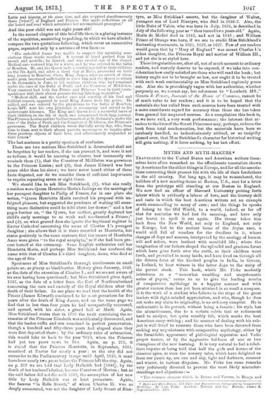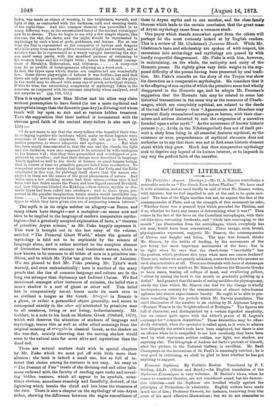MYTHS AND MYTH-MAKERS.*
TRAVELLERS to the United States and American authors them- selves have often remarked on the affectionate veneration shown by Americans for the oldest things in Europe, and for all the associa- tions connecting their present life with the life of their forefathers in the old country. Not long ago, it may be remembered, the builders of a new meeting-house at Boston, U.S., sent for a brick from the prototype still standing at our Boston in England. We now find an officer of Harvard University putting forth labour which is evidently a labour of love, and the literary skill and taste in which the best American writers set an example worth commending to many of ours ; and the things he speaks of belong to the Old World, to a world, indeed, so far off that for centuries we had lost its meaning, and have only just learnt to spell it out again. His theme takes him back from the New World, not only to England, not only to Europe, but to the ancient home of the Aryan race, a world still full of wonders for the dwellers in it, whose changes of days and seasons, interpreted by the analogy of human will and action, were instinct with manifold life ; where the imagination of our fathers shaped the splendid and gracious forms which have gone forth over the earth, as their children went forth, and prevailed in many lands, and have lived on through all the diverse fates of the kindred peoples in India, in Greece, in Iceland, to bear witness in the latter days to the unity of the pareut stock. This book, which Mr. Fiske modestly introduces as a "somewhat rambling and unsystematic series of papers," seems to us to give the leading results of comparative mythology in a happier manner and with greater success than has yet been attained in so small a compass. It is the work of a student who follows in the steps of the great leaders with right-minded appreciation, and who, though be does not make any claim to originality, is no ordinary compiler. Ile is enthusiastic in his pursuit, without being a fanatic ; his style has the attractiveness, due to a certain subtle tact or refinement hard to analyse, but quite sensibly felt, which marks the best American essay-writing ; and his manner of dealing with his sub- ject is well fitted to reassure those who have been deterred from seeking any acquaintance with comparative mythology, either by the formidable appearance of philological apparatus and Vedic proper names, or by the aggressive boldness of one or two champions of the new learning. It is very natural to feel a rebel- lious impulse at being told that half the gods and heroes of the classical epics, or even the nursery tales, which have delighted us from our youth up, are sun and sky, light and darkness, summer and winter, in various disguises. Mr. Fiske has some remarks very judiciously directed to prevent the most likely misunder- standings and objections :— "The common element which, in Dyaus and Varana, in Bhaga and # Myths and Myth-Makers: Old Tales and Superstitions Interpreted by Comparative Mythology. By John Fiske. London: Triibnor and Co. Boston : J11.13103 Osgood and Co. 1673.
Indra, was made an object of worship, is the brightness, warmth, and light of day, as contrasted with the darkness, cold, and seeming death of the night-time. And this common element was personified in as many different ways as the unrestrained fancy of the ancient worshipper saw fit to devise. Thus we begin to see why a few simple objects, like the sun, the sky, the dawn, and the night, should be represented in mythology by such a host of gods, goddesses, and heroes. For at one time the Sun is represented as the conqueror of hydras and dragons who hide away from men the golden treasures of light and warmth, and at another time he is represented as a weary voyager traversing the sky- sea amid many perils, with the steadfast purpose of returning to his western home and his twilight bride ; hence the different concep- tions of Herakles, Bellerophon, and Odysseus A story-root may be as prolific of heterogeneous offspring as a word-root In fact, the types upon which stories are constructed are wonderfully few. Some clever playwright—I believe it was Scribe—has said that there are only seven possible dramatic situations; that is, all the plays in the world may be classed with some one of seven archetypal dramas. If this be true, the astonishing complexity of mythology taken in the concrete, as compared with its extreme simplicity when analysed, need not surprise us." (pp. 110, 115.) Thus it is explained how Max Midler and his allies may claim without presumption to have found (to use a more mythical and appropriate image than the domestic pass-key) a divining-rod whose touch will lay open so rich and so various hidden treasures. Then the supposition that their method is inconsistent with the obvious good faith of the ancient story-tellers is also met (p. 133) :—
"I do not mean to say that the story-tellers who beguiled their time in stringing together the incidents which make up those legends were conscious of their solar character. They did not go to work, with malice prepense, to weave allegories and apologues But what has been amply demonstrated is, that the sun and the clouds, the light and the darkness, were once supposed to be actuated by wills analogous to the human will ; that they were personified and worshipped or pro- pitiated by sacrifice ; and that their doings were described in language which applied so well to the deeds of human or quasi-human beings, that in course of time its primitive purport faded from recollection. No competent scholar now doubts that the myths of the Veda and the Edda originated in this way, for philology itself shows that the names em- ployed in them are the names of the great phenomena of nature. And when once a few striking stories had thus arisen,—when once it had been told how Indra smote the Paula, and how Sigurd rescued Brynhild, and how Odysseus blinded the Kyklops,—then certain mythic or dra- matic types had been called into existence ; and to these types, pre- served in the popular imagination, future stories would inevitably con-
form The aim-myths have been so prolific because the dramatic types to which they have given rise are of surpassing human interest."
The myth is in its origin neither an allegory—as Bacon and many others have thought—nor a metaphor—as seems now and then to be implied in the language of modern comparative mytho- logists—but a genuinely accepted explanation of facts, a" theorem of primitive Aryan science," as Mr. Fiske happily expresses it. This view is brought out in the last essay of the volume, entitled "The Primeval Ghost World," where the genesis of mythology is held not to be explicable by the science of language alone, and is rather ascribed to the complete absence of distinction between animate and inanimate nature, which is now known to be common to all tribes of men in a primitive con- dition, and to which Mr. Tylor has given the name of Animism. We are pleased to find Mr. Fiske praising Mr. Tylor's work warmly, and even enthusiastically : here is another of the many proofs that the ties of common language and culture are in the long run stronger than diplomacy and Indirect Claims. We find mentioned, amongst other instances of animism, the belief that a man's shadow is a sort of ghost or other self. This belief has in comparatively recent times made its mark even in so civilised a tongue as the Greek. Irotxub in Romaic is a ghost, or rather a personified object generally, and seems to correspond exactly to the other self attributed by primitive man to all creatures, living or not living, indiscriminately. Mr. Geldart, in a note to his book on Modern Greek (Oxford, 1870), which well deserves the attention of students of language and mythology, traces this as well as older allied meanings from the original meaning of s.roixeibv in classical Greek, as the shadow on the sun-dial, acutely observing that the moving shadow would seem to the natural man far more alive and mysterious than the fixed rod.
There are several matters dealt with in special chapters by Mr. Flake which we must put off with little more than allusion : the book is indeed a small one, but so full of in- terest that choice among its contents is not easy. An essay on "The Descent of Fire" treats of the divining-rod and other talis- mans endowed with the faculty of rending open rocks and reveal- ing hidden treasure, which all appear to be symbols, some- times obvious, sometimes remotely and fancifully derived, of the lightning which breaks the cloud and lets loose the treasures of the rain. There is also a chapter on the mythology of non-Aryan tribes, showing the difference between the vague resemblance of
these to Aryan myths and to one another, and the close family likeness which leads to the certain conclusion that the great MU& of Aryan mythology came from a common stock.
One paper which stands somewhat apart from the others will perhaps be the most curiously looked at by English readers.. This is a review of Mr. Gladstone's Juventus Mundi. While Mr. Gladstone's taste and scholarship are spoken of with respect, his excursions into archmalogy and mythology are passed by with hardly respectful disagreement. Mr. Fiske is with him, however,. in maintaining, on the whole, the antiquity and unity of the' Homeric poems. He rightly gives very little weight to the sup- posed difficulty of the poems having been preserved by oral tradi- tion. Mr. }like's remarks on the story of the Trojan war show his discretion as a comparative mythologist. He considers that it is the offspring of sun-myths of which the primitive sense had wholly disappeared in the Homeric age, and he adopts Mr. Freeman's suggestion that the Homeric tale may be related to some lost historical transactions in the same way as the romances of Charle- magne, which are completely mythical, are related to the deeds of the real Karl of history : thus '4 Agamemnon and Menelaos may represent dimly remembered sovereigns or heroes, with their char- acters and actions distorted to suie the exigencies of a narrative founded upon a solar myth." As the occurrence of known historic persons (e.g., Attila in the Nibelungenlied) does not of itself pre- vent a story from being in all essential features mythical, so the- existence or even preponderance of mythical elements does not authorise us to say that there was not at first some historic element about which they grew. Much less does comparative mythology seek to deprive any legend of its human interest, or to impeach in, any way the perfect faith of the narrator.































 Previous page
Previous page